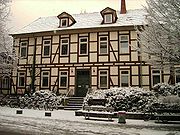
Göttingen Academy of Sciences
Encyclopedia

Germany
Germany , officially the Federal Republic of Germany , is a federal parliamentary republic in Europe. The country consists of 16 states while the capital and largest city is Berlin. Germany covers an area of 357,021 km2 and has a largely temperate seasonal climate...
. It has the task of promoting research under its own auspices and in collaboration with academics in and outside Germany. It has its seat in the university town of Göttingen
Göttingen
Göttingen is a university town in Lower Saxony, Germany. It is the capital of the district of Göttingen. The Leine river runs through the town. In 2006 the population was 129,686.-General information:...
.
History
The Königliche Gesellschaft der Wissenschaften ("Royal Society of Sciences") was founded in 1751 by King George II of Great BritainGeorge II of Great Britain
George II was King of Great Britain and Ireland, Duke of Brunswick-Lüneburg and Archtreasurer and Prince-elector of the Holy Roman Empire from 11 June 1727 until his death.George was the last British monarch born outside Great Britain. He was born and brought up in Northern Germany...
, who was also Prince-Elector
Prince-elector
The Prince-electors of the Holy Roman Empire were the members of the electoral college of the Holy Roman Empire, having the function of electing the Roman king or, from the middle of the 16th century onwards, directly the Holy Roman Emperor.The heir-apparent to a prince-elector was known as an...
of the Holy Roman Empire
Holy Roman Empire
The Holy Roman Empire was a realm that existed from 962 to 1806 in Central Europe.It was ruled by the Holy Roman Emperor. Its character changed during the Middle Ages and the Early Modern period, when the power of the emperor gradually weakened in favour of the princes...
and Duke of Brunswick-Lüneburg
Brunswick-Lüneburg
The Duchy of Brunswick-Lüneburg , or more properly Duchy of Brunswick and Lüneburg, was an historical ducal state from the late Middle Ages until the late Early Modern era within the North-Western domains of the Holy Roman Empire of the German Nation, in what is now northern Germany...
(Hanover), the German state in which Göttingen was located. The first president was the Swiss natural historian and poet Albrecht von Haller
Albrecht von Haller
Albrecht von Haller was a Swiss anatomist, physiologist, naturalist and poet.-Early life:He was born of an old Swiss family at Bern. Prevented by long-continued ill-health from taking part in boyish sports, he had the more opportunity for the development of his precocious mind...
. It was renamed the "Akademie der Wissenschaften zu Göttingen" in 1939. Among the learned societies
Learned society
A learned society is an organization that exists to promote an academic discipline/profession, as well a group of disciplines. Membership may be open to all, may require possession of some qualification, or may be an honor conferred by election, as is the case with the oldest learned societies,...
in the Federal Republic of Germany, the Göttingen academy is the second-oldest after the Halle
Halle, Saxony-Anhalt
Halle is the largest city in the German state of Saxony-Anhalt. It is also called Halle an der Saale in order to distinguish it from the town of Halle in North Rhine-Westphalia...
-based Leopoldina (1652).
Organisation
The Academy is a Körperschaft des öffentlichen Rechts and has the task to serve academic research in its own work and in collaboration with researchers and institutions inside and outside Germany. Its members are divided into two classes, the Mathematical-Physical class and the Philological-Historical class. There are a maximum number of forty full members in each class and a maximum of one hundred corresponding members, elected from the rest of Germany and outside the country.The review and literature journal Göttingische Gelehrte Anzeigen has been published by the Academy since 1753 and is the oldest academic journal still published in the German-language area. The Academy belongs to the Union of the German Academies of Sciences and Humanities (Union der deutschen Akademien der Wissenschaften).
Current president of the Göttingen Academy is the chemist Herbert W. Roesky
Herbert W. Roesky
Herbert Roesky, , is an internationally renowned inorganic chemist.-Biography:Professor Herbert W. Roesky was born in 1935 in Laukischken. He obtained his doctorate from Göttingen and worked at Du Pont in the US before returning to his alma mater where he retired in 2004...
. Vice presidents are the ancient historian Gustav Adolf Lehmann and the neurobiologist Norbert Elsner.
Prizes
The Academy awards the following prizes:- Academy Prize for Biology (Akademie-Preis für Biologie)
- Academy Prize for Chemistry (Akademie-Preis für Chemie)
- Academy Prize for Physics (Akademie-Preis für Physik)
- Grimm Brothers Medal (Brüder-Grimm-Medaille)
- Gauss Visiting Professorship (Gauß-Professur der Akademie der Wissenschaften zu Göttingen)
- Dannie Heineman Prize (Dannie-Heineman-Preis)
- Hans Janssen Prize (Hans-Janssen-Preis)
- Hanns Lilje Prize (Hanns-Lilje-Preis)
- Lichtenberg Medal (Lichtenberg-Medaille)
- Sartorius Prize (Sartorius-Preis)
- Wallstein Prize (Wallstein-Preis)
- Wedekind Prize (Wedekind-Preis), the Academy Prize for History
Literature
- Karl Arndt: Göttinger Gelehrte. Die Akademie der Wissenschaften zu Göttingen in Bildnissen und Würdigungen 1751–2000. 2 Bände. Wallstein, Göttingen 2001, ISBN 3-89244-485-4.
- Holger Krahnke: Die Mitglieder der Akademie der Wissenschaften zu Göttingen 1751–2001. Vandenhoeck & Ruprecht, Göttingen 2001, ISBN 3-525-82516-1 (Abhandlungen der Akademie der Wissenschaften zu Göttingen, Philologisch-Historische Klasse, 3. Folge, Bd. 246/Mathematisch-Physikalische Klasse, 3. Folge, Bd. 50).
- Achim Link: Die Veröffentlichungen der Akademie der Wissenschaften zu Göttingen 1751–2001. Bibliographie mit Schlagwort-Katalog. Vandenhoeck & Ruprecht, Göttingen 2001, ISBN 3-525-82518-8 (Abhandlungen der Akademie der Wissenschaften zu Göttingen, Philologisch-Historische Klasse, 3. Folge, Bd. 245/Mathematisch-Physikalische Klasse, 3. Folge, Bd. 49).
- Rudolf Smend, Hans-Heinrich Voigt (Hrsg.): Die Wissenschaften in der Akademie. Vorträge beim Jubiläumskolloquium der Akademie der Wissenschaften zu Göttingen im Juni 2000. Vandenhoeck & Ruprecht, Göttingen 2002, ISBN 3-525-82519-6 (Abhandlungen der Akademie der Wissenschaften zu Göttingen, Philologisch-Historische Klasse, 3. Folge, Bd. 247/Mathematisch-Physikalische Klasse, 3. Folge, Bd. 51).
- Rudolf Smend (Hrsg.): Wissenschaft entsteht im Gespräch. 250 Jahre Akademie der Wissenschaften zu Göttingen. Wallstein, Göttingen 2002, ISBN 3-89244-624-5.

